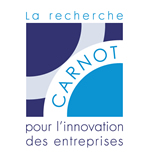Curie Cancer Carnot Institute and Freenome announce a strategic collaboration in cell-free DNA analysis using machine learning technology
Curie Cancer Carnot Institute and Freenome announce a strategic collaboration to evaluate Freenome’s artificial intelligence (AI) genomics platform as a novel tool to predict patient response to immuno-oncology therapies by observing changes in circulating cell-free biomarkers.
<p> <a href="/en/carnot-institute/curie-cancer" target="_blank">Curie Cancer Carnot Institute</a> and <a href="http://www.freenome.com" target="_blank">Freenome</a> announce a strategic collaboration to evaluate Freenome’s artificial intelligence (AI) genomics platform as a novel tool to predict patient response to immuno-oncology therapies by observing changes in circulating cell-free biomarkers.</p> <p> In recent years so-called liquid biopsies have established the possibility of detecting circulating fragments of tumor DNA (ctDNA) and circulating tumor cells (CTCs) in the blood of patients with cancer. Institut Curie has been a pioneer in the field since the late 90’s with the first program on disseminated tumor cell (DTC) detection in the bone marrow of patients with early breast cancer. Since then, Institut Curie’s Circulating Tumor Biomarkers Laboratory has developed numerous innovative ctDNA techniques (ddPCR and NGS-based techniques).</p> <p> Meanwhile, Freenome’s breakthrough use of machine learning looks beyond tumor DNA and processes the full range of cell-free (cf) biomarkers in the blood. By assembling an ever-expanding library of cell-free disease signatures, Freenome is developing a range of non-invasive blood tests for the early detection of cancer and early prediction of response to various oncology therapies. As a first step in this collaboration with Institut Curie, Freenome will analyze samples from the Analysis of Circulating Tumor Markers in the Blood (ALCINA) Trial, an umbrella trial allowing assessment of different circulating biomarkers and their correlation with clinical and pathological characteristics pertaining to response to PD-1 inhibitors alone and in combination with other therapies.</p> <p> <a class="lien" href="https://techtransfer.institut-curie.org/news/partnership/institut-curie…; target="_blank"><strong><em>More information</em></strong></a></p>

